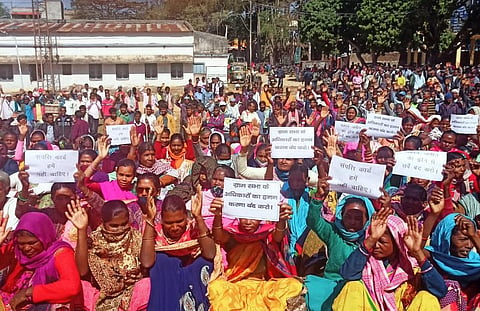

Gram Sabhas in Torpa and Karra blocks of Jharkhand’s Khunti district have resolved not to allow drone surveys to be conducted within their villages, as part of the Ownership Scheme.
A meeting was held in front of Torpa block headquarters February 7, 2022. It was attended by the headmen of 32 Gram Sabhas.
Amrit Kungkadi, 40, Gram Pradhan (chief of the first tier of local government) of Urikal (Torpa block), who attended the meeting, said, “Our Gram Sabha met February 3 and decided not to allow drone surveys to take place in the village. There are 77 villages like ours, whose headmen have taken similar decisions.”
Some 662,162 villages across all states of India will be surveyed with drone technology under the proposed ownership scheme of the Government of India.
The villagers will be given personal rights records ie property cards. The government has said villagers will get many benefits through the card and villages will be developed.
The government believes that villagers do not have land papers and the card will be a sort of solid record for them. People will also be able to avail the benefits of legal aid, relief from encroachment, bank loans, etc.
Kungkadi said his people wanted development but did not approve of any violation of their tradition and culture.
Rejan Topno, another village headman of Torpa block, who joined the protest, said: “The khatiyan (land document) of 1932 has the names of our grandfathers and great-grandfathers. It has all the details. In our view, if this survey is done, we will lose the khatiyan. Also, how do we know whether the property card that the government gives will be correct or not?”
Topno, 62, said his people were not fully informed about the survey, which was the main reason behind the protest.
“They (the government) say there will be a survey of the house following which the property card will be made. Property does not include just houses. Will the property card also include our farm, community land, plants, cattle and goats? Villagers should first sit down and understand the whole thing. The officials are not giving the complete information.”
Topno is the headman of Karra village that falls in the Marcha panchayat of Torpa block. The villagers fear their community land, on which the community have farmed for many generations, will be lost.
Hence, they say they will not allow any survey to be conducted without the consent of the Gram Sabha.
Riyaz Sayyed, Khunti sub-divisional officer, however, said people were being misled. “Full information about the survey is being given to the people. The survey work in Karra block has been completed. It has also been done in 45 villages of Torpa. The work is being done very much with the consent of the Gram Sabha,” he said.
Sayyed said there will be no survey of community land. “No previous act such as Panchayats (Extension to Scheduled Areas) Act, 1996, will be violated. There will also be no change in the khatiyan of 1932. The rights of the villagers on the community land will remain as before,” he said.
But Damyanti Barla, convener and activist of the Adivasi-Moolvasi Astitva Raksha Manch, said Jharkhand was distinct from other Indian states since tribals here had their own language, culture and traditions, which were based on co-existence with water, forests and land.
“The social, economic, cultural and political strength of the tribals of this state is associated with water, forests and land. They have their own separate constitutional rights. We demand that the government stop this exercise at all costs,” she said.
Barla has been continuously raising her voice against the scheme. She has twice met Alamgir Alam, Jharkhand’s Minister of State for Panchayati Raj, and Khunti’s deputy commissioner and submitted a memorandum of protest.
In the first phase of the project, 2020-21, 100,000 people in 763 villages in six states have been given property cards.
The second phase (2021-22) is to be carried out in 20 states, and includes the drone survey. The phase includes the Khunti district of Jharkhand.
There are 32,620 villages in Jharkhand according to state government data. But according to the Ownership Scheme’s website, a drone survey is to be carried out in 32,712 villages.